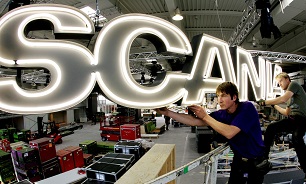VW's Scania truck firm fined €880m by EU for price fixing
European commission says Swedish truckmaker colluded for 14 years with five other European rivals on pricing.

Khodrocar - The Swedish truckmaker Scania, which is owned by Volkswagen, has been fined €880m (£770m) by EU antitrust regulators for price fixing.
The European commission said Scania had broken antitrust rules by colluding for 14 years with five other European truck manufacturers on pricing.
The manufacturers have been fined €3.8bn in total – a record penalty imposed by the commission for a vehicle cartel.
The manufacturers have been fined €3.8bn in total – a record penalty imposed by the commission for a vehicle cartel.
The other five members of the cartel – Daimler, DAF, MAN, Iveco and Volvo/Renault – settled with the commission a year ago but Scania refused to cooperate, the commission said.
Scania maintains its innocence and says it fully cooperated with the commission and was likely to appeal.
A Scania spokeswoman said: "We just received the information and it will take some time to go through the material. If no new information has emerged in the investigation we are planning to prepare an appeal against the decision.”
She added: "Scania has not on any level or in any context entered into an agreement with other manufacturers with regards to pricing. Scania has also not delayed the introduction of new engines that meet EU legislation on exhaust emissions.”
MAN, also owned by VW, alerted the commission to the cartel and escaped a €1.2bn fine. The other four received reduced fines for settling. The biggest penalty, of €1bn, was imposed on Germany’s Daimler. Dutch company DAF was fined €753m, Volvo/Renault €670m and Italy’s Iveco €495m.
MAN, also owned by VW, alerted the commission to the cartel and escaped a €1.2bn fine. The other four received reduced fines for settling. The biggest penalty, of €1bn, was imposed on Germany’s Daimler. Dutch company DAF was fined €753m, Volvo/Renault €670m and Italy’s Iveco €495m.
Margrethe Vestager, the European commissioner for competition, said: "Today’s decision marks the end of our investigation into a very long-lasting cartel – 14 years.
"This cartel affected very substantial numbers of road hauliers in Europe, since Scania and the other truck manufacturers in the cartel produce more than nine out of every 10 medium and heavy trucks sold in Europe. Instead of colluding on pricing, the truck manufacturers should have been competing against each other – also on environmental improvements.”
"This cartel affected very substantial numbers of road hauliers in Europe, since Scania and the other truck manufacturers in the cartel produce more than nine out of every 10 medium and heavy trucks sold in Europe. Instead of colluding on pricing, the truck manufacturers should have been competing against each other – also on environmental improvements.”
She said road haulage was an essential part of the European transport sector, and its competitiveness depended on truck prices.
The collusion began at a meeting at a hotel in Brussels in January 1997, according to the commission.
Senior managers colluded at meetings on the fringes of trade fairs and other events, and also discussed price fixing by phone. From 2004, the cartel was run by lower- level managers through the companies’ German subsidiaries and information was exchanged by email.
The truck makers coordinated "gross list” prices and also colluded on passing on to customers the costs of new technologies to meet stricter emission rules.
The commission said its investigation did not reveal any links between this cartel and the use of defeat devices to cheat emissions tests.
The commission said its investigation did not reveal any links between this cartel and the use of defeat devices to cheat emissions tests.
Source: Guardian
Latest News


